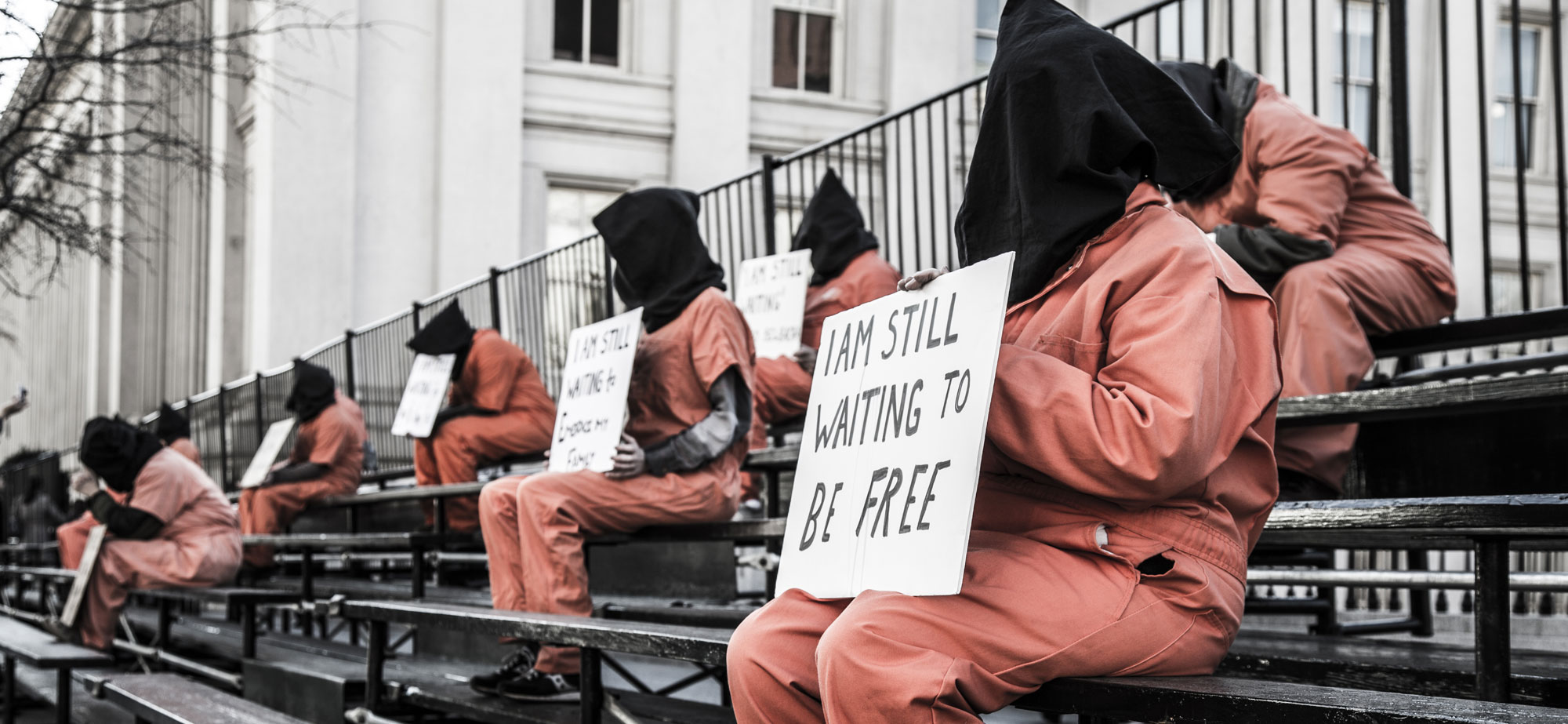From the Archive
Closing Guantánamo : The National Security, Fiscal, and Human Rights Implications
Hearing Before the Senate Judiciary Subcommittee on the Constitution, Civil Rights, and Human Rights
July 22, 2013
Witness Against Torture —Statement for the Record
To the Senate Judiciary Subcommittee on the Constitution, Human Rights, and Civil Rights:
We are Witness Against Torture, a grassroots organization that has worked since 2005 to close the prison at Guantánamo, end US torture, advocate accountability for the torturers, and justice for the victims. We are not lawyers, or political figures, or professional advocates. Rather, we are women and men, of diverse backgrounds, ages, occupations and faiths, devastated by the US’s embrace of torture and indefinite detention and determined to have our government abide by the Constitution, its founding ideals, and the principles of human rights and justice it professes. For many of us, this work has been, along with our dedication to our families and communities, the most important commitment in our lives.
We represent, in short, an important part of the citizen voice, so often left out of media coverage of Guantánamo and government deliberations over detention policy. For years now, the myth of public indifference toward Guantánamo has functioned as an excuse — by the White House especially, but by Congress also — for official inaction. That myth, and that inaction, must end.
Indeed, the ongoing hunger strike at Guantánamo has galvanized anew public concern over the prison. Since the strike began in February, there have been hundreds of rallies and vigils in American cities and towns; the collection of more than 300,000 petition signatures calling for the closure of Guantánamo (one petition, issued by the Former Guantánamo Chief Prosecutor Colonel Morris Davis, garnered more than 200,000 signatures in two weeks); countless calls of protest to the White House and the US Southern Command; thousands of letters of sympathy to the Guantánamo detainees; the participation of hundreds of people in solidarity fasts with the hunger strikers; a delegation of US activists to Yemen to meet with the family members of detained men; and non-violent arrest actions at the White House, at Federal Court in New York City, and in other cities around the country. Two US military veterans are currently on perilous hunger strikes of their own (66 and 44 days, respectively) in protest of Guantánamo.
Young people especially are now flocking to the movement to close the prison. Just children when the 9-11 attacks happened — and thus too young to have internalized the politics of fear defining the early “war on terror” — they can scarcely comprehend that such a place as Guantánamo exists, which so grossly violates American notions of due process and basic, human decency. Not since the worst days of the Bush administration has Witness Against Torture seen such an outpouring of solidarity with the detained men, anger at US policy, and public action to close Guantánamo.
Most importantly, the hunger strike at Guantánamo, the sickening practice of force-feeding, and other, petty cruelties have again shattered the fiction that Guantánamo is a “humane” prison. Rather, it is a place of persisting torture, whether through physical abuse or the torment of indefinite detention.
It is as wrong today as it was when it first opened, and it must close immediately, in a just and responsible way.
We appreciate this opportunity to address Congress as it reconsiders the very existence of the prison. We first narrate the history of our group, highlighting the range of our activities and the many dimensions of the Guantánamo saga they touch upon. Next, we outline our core perspective on Guantánamo and our sense of what closing the prison ultimately requires. We conclude by sharing a poem that captures with special force our position, our passion, and our view of what justice with respect to Guantánamo means.
Witnessing Against Torture
Witness Against Torture got its start when, in December 2005, twenty five US citizens traveled to Cuba at great legal risk to protest the prison at the gates of the US Naval base itself. Moved in part by their Christian faith to oppose torture, many also prayed in compassion for the men held there. Word of the protest made it to the detained men, who in turn conveyed through attorneys their appreciation for the concern of Americans with their plight.
After returning to the United States, the group worked to mobilize opposition to Guantánamo and confront those responsible for detention policy. Witness Against Torture’s activism has entailed annual demonstrations in Washington, D.C. on January 11 (the date of the prison’s opening in 2002); group fasts of ten days or more to accompany the January protests; countless educational events at universities, churches and community centers; lobbying and other outreach efforts to lawmakers; numerous media interviews, letters-to-the-editor, and other published writings; and work in coalition with groups like the Center for Constitutional Rights and Amnesty International to organize rallies, press briefings, and symposia. We are perhaps best known for our for silent processions of people in orange jumpsuits and black hoods — the iconic, globally recognized image of the Guantánamo prisoner — in Washington, D.C. and other cities. Images of our protests have accompanied hundreds of news stories worldwide.
Throughout, Witness Against Torture has been motivated by desire to see the detained men in human terms, and not as they are cynically (and inaccurately) depicted in the media and the rhetoric of government. Hence, we have carried their pictures and recited their names in public, shared their stories and their poetry, and reached out to their families.
We have also educated ourselves in the circumstances of their capture and the overwhelmingly flimsy “evidence” — often obtained under torture — used to “justify” their detention. Such information goes to the heart of our protest, as it exposes the “great lie” with respect to Guantánamo: that the prison houses only “the worst of the worst,” who mean America grave harm. This fiction, first promulgated by Dick Cheney and other architects of Guantánamo but repeated to this day by lawmakers and pundits, has poisoned public understandings of Guantánamo and inhibited responsible changes in detention policy.
To be sure, Guantánamo now houses a handful of so-called “high value detainees,” likely guilty of serious crimes (though these were largely transferred to Guantánamo from black sites, one may recall, only in the fall of 2006 so as to bolster support for the Military Commissions Act). But the vast majority of the population, as credible research has shown, were captured neither “on the battlefield” nor by US forces. In fact, many were sold for bounty to US forces and are guilty of nothing more than being in the wrong place at the wrong time. Others were foot soldiers with the Taliban and various militias, hardly worthy of extended interrogation and confinement. Moreover, no less a figure than Secretary Colin Powell’s Chief of Staff, Lt. Col. Lawrence Wilkerson, signed an affidavit reporting that leading figures in the Bush administration knew that the great majority of prisoners at Guantánamo were far from committed terrorists. Much of our work, therefore, has been devoted to piercing the smog of propaganda and ignorance by revealing the reality of Guantánamo and just who is held there. In this work, we have been stunned to see how tenaciously Guantánamo’s apologists shield themselves from the truth of America’s disgraceful conduct, as if perpetuating falsehoods exonerates that shame.
In addition, Witness Against Torture has for years participated in non-violent civil disobedience, in the great tradition of Martin Luther King, Jr., Dorothy Day, and Gandhi. Notably, in January 2006 we engaged in a mass arrest at the District Court in Washington, D.C., where the cases of the detainees would be heard if they had proper access to federal courts. A year later, as the Supreme Court considered whether the detainees had habeas rights, over 100 of us were arrested at the courthouse. When arrested, many of us did not produce our own identification but instead took the names of detainees, so as to give them symbolically the day in court their captors had to that point denied. At the trial stemming from our arrest we spoke on behalf of the detained men and worked to put Guantánamo itself on trial. In 2009, a dozen members of Witnessed Against Torture were arrested in the rotunda of the Capitol, where they lay death shrouds and flowers in honor of three prisoners who died in Guantánamo in 2006, possibly by having been tortured to death.
We believe, with great champions of justice through the ages, that the law may be broken — compassionately, non-violently — when law itself becomes the enemy of justice. Such acts of civil disobedience themselves expose fractures in the law and the need for law to heal itself. We have further embraced non-violent civil disobedience as a means to communicate to the US government, the men on whose behalf we struggle, and the eyes of the world the commitment of US citizens to oppose torture and indefinite detention. Last, we see the US legal system, responsible in part for the detainees’ abuse, as a vital arena for our protest and our witness.
The activities of Witness Against Torture have evolved as the politics of Guantánamo have changed. Our hopes soared when President Obama signed on day one of his administration an Executive Order mandating that Guantánamo close within a year. To support the President in this policy, we launched a “100 Days to Close Guantánamo”campaign, keeping daily vigil at the White House.
We then saw defeat snatched from jaws of victory. The President, fearful of potential political costs and clearly weak in his commitment to his own policy, stepwise abandoned his plan for closing the prison. Members of Congress, exploiting fear and seeking cheap political points, imposed onerous restrictions on the transfer of detainees, further hobbling the administration’s faint efforts. Grossly inflated Department of Defense statistics on former detainees “returning to the battlefield,” invoked as reason to maintain Guantánamo, lay unchallenged by the Obama administration and much of the press. President Obama, moreover, embraced the letter or the spirit of policies of the Bush administration he had once opposed, from the Military Commissions, to the granting of functional immunity for all those implicated in the US torture program, to efforts to gut the habeas rights granted detainees by the Supreme Court. Over time, the media largely lost interest in Guantánamo, while Americans appeared to learn to live with the permanence of the prison and America’s identity as a torture nation.
Much of our work in the last four years has been to call out the hypocrisy of President Obama, to keep Guantánamo on the political radar and in the conscience of the nation, and to give, by our continued protest, some small measure of hope to detained men facing the dismal prospect of lifetimes of detention, without the chance of proper due process.
In the face of their brutal condition, the detained men themselves acted to seize their own destiny by starting a new hunger strike in February of this year. Repeatedly described by them as a desperate act to secure dignity and justice, the hunger strike represents the best and perhaps last occasion for the United States to reckon with Guantánamo and begin to set right a terrible wrong. President Obama himself acknowledged the urgency of the situation and the need to restart efforts to close the prison. But his speech was already nearly two months ago, during which time not a single detained man — even among the 86 cleared for transfer by the US government itself — has been released from the prison. As yet there is only a renewed promise, which must now become a concrete plan, followed by decisive action. Our work, therefore, continues.
Opposing Guantánamo , Closing the Prison
The consistent position of Witness Against Torture, underscored by the current hunger strike, is that Guantánamo is a moral and legal abomination. It violates the Constitution, makes a mockery of the rule of law, and savages American ideals. It grossly diminishes America’s standing in the world. It weakens our safety. It holds us captive to fear and implicates all of us in a terrible evil, recognized as such by most of the world, and for which history will judge the United States harshly.
President Obama’s failure to close Guantánamo and embrace of Bush-era policies vindicate neither the prison nor those policies. Rather, they show how broadly the American political system is complicit in grave ills. Guantánamo and torture have never been matters of left and right. We see them, rather, as matters of right and wrong, which must be rejected, regardless of partisan affiliation and political calculation.
We are well versed in policy detail, legal particulars, partisan maneuvering, and all the barriers, real and perceived, to now closing Guantánamo. Great political skill will doubtless be required to finally shutter the prison. But above all, what is required is moral courage and the political will to do so, in the face of persisting fear-mongering and the anxiety of numerous institutions and agents of government that closing Guantánamo may expose them to further embarrassment and political risk.
President Obama must honor his intentions. The integrity of the nation, his legacy, and most importantly, the lives of the detained men are at stake. We ask Congressional critics of Guantánamo both to hold the President to his word and to remove legislative barriers to Guantánamo’s swift closure. To those lawmakers uncertain about the prison, we plead that they educate themselves in facts and listen to voices in the US military who maintain that Guantánamo makes the United States neither stronger nor more secure. To those defenders of Guantánamo — whether acting in ignorance, with malice, or out of misguided conviction —we insist that they now step to the sidelines of politics and history, before they do more damage to the United States and the principles of fairness and justice it claims. Saving the remnants of America’s tattered honor must take precedence over saving face. With faith in our own ideals and power and possibility of redemption, justice can prevail.
The Greatest Threat to Ourselves
At our rallies and vigils, we often hold moments of silence, sing songs, and recite poems. One such poem, written by a young, gifted member of our group, speaks in a special way to our values, our actions, and the stakes of resisting Guantánamo and torture. Above all, it asks who we are, as a people and a nation, and what our own ideals oblige us to do. We share this poem so that you may consider these questions yourselves:
There is a Man Under That Hood • By Luke Nephew
We are not here to make angels out of prisoners. We don’t know them,
but we know they still are men.
And so we defend those that disappear
under hoods into jumpsuits, bringing back
into the light every CIA black site because right now
there is a man under that hood.
A brother breathing prayers of desperation, striking hunger so hard that his ribs
are about to crack
in Afghanistan, in Guantánamo , in Iraq.
There is a man under that hood
who is being treated as less than human. His rights have been dismissed
with the label terrorist
and just for saying this
you probably put my name on a list,
but it is too serious to us to not resist.
Mr. President, I need you to know,
if it were you hooded and chained,
we would be here demanding the same human rights for you.
Mr. Senator, we would walk through these streets with your name on our back.
We would fast in solidarity with your hunger strike.
Mrs. Congresswoman, even after months under black cloth
making you cough,
we would speak for you.
Mr. Newsman, Mrs. Citizen,
we would be right here for you, because human rights are universal.
This is life, not a rehearsal.
We, we are here because we cannot decide who is human and who is not.
We cannot steal years of men’s lives
based on lies extracted from torture and bribes
without becoming the greatest threat to ourselves.
We have sat inside a cell
and it has taught us how wrong it is to cage men because they fell like corpses
into the category of enemy combatants.
I will not act like nothing happened when it’s happening now.
I will not bow
to injustice. I will speak
for the change that was promised.
I’m not ashamed to be honest, Mr. President.
We have cried, Mr. President.
Clouds of consciousness overflowing out these eyes, Mr. President, for the moments when we
have the courage to realize
that there is a man under that hood.
No matter how beaten and bruised, there is a man under that hood that is exactly as human as you.
There is a man under that hood regardless of his religion. There is a man who doesn’t understand
why it’s so hard for us to see him,
why it’s so hard for us to imagine
what is would be like to be him
there, where they sit in our prisons hidden from our justice system,
locked away.
Are we going to pretend
they’re less than men and just walk away?
Or will we raise our eyes above the walls?
Will we raise our voices to call out our government and say we see you;
we are watching what you’re doing?
And no matter how many times
they call you terrorist,
we will recognize that you are human.
And to the detainees,
no matter how broken and shattered and tortured you feel, there are people in these United States who hear you
and see you, who know that you are real.
And to the people in my country, please,
do not pretend to be seeking freedom
or justice, or any common good
until we are ready to recognize the human rights of every single man under that hood.



Join us on social media